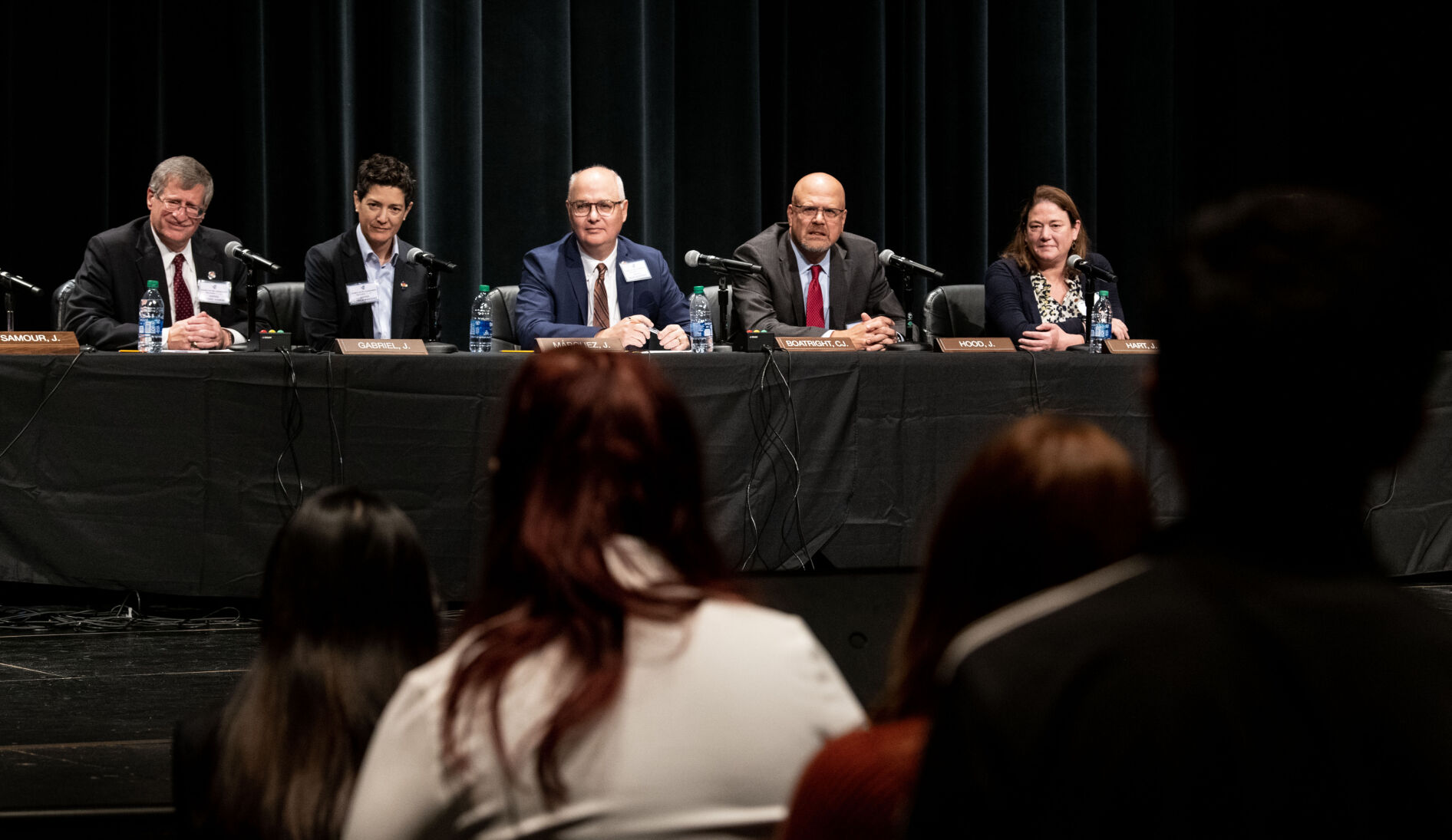Colorado justices to consider financial penalties on lawyers, notice for evictions under COVID rules

The Colorado Supreme Court announced on Monday that it will hear an appeal implicating the ability of law firms to financially penalize their attorneys for leaving for another job and taking clients with them.
The justices also signaled they will decide whether a federal law enacted during the early COVID-19 pandemic still requires certain landlords to provide a 30-day notice prior to an eviction or if that requirement has since expired.
To hear an appeal, at least three of the court’s seven members must consent to granting the petition.
The Supreme Court narrowly turned down a third case, letting stand the appellate court’s ruling in an international dispute over child support.
Penalties for departing lawyers
Johnson Family Law, also known as Modern Family Law, sued one of its former attorneys after he left for another firm and brought 18 clients with him. Grant Bursek signed MFL’s reimbursement agreement, which stipulated that if a departing attorney wants to keep representing clients they obtained through the firm, they would need to pay $1,052 per person.
The amount was based on MFL’s “historic costs” in marketing its firm to new clients. Altogether, Bursek owed MFL $18,936 when he left. However, Bursek refused to pay, calling the agreement unenforceable.
In October 2020, then-Denver District Court Judge Morris B. Hoffman agreed with Bursek. Colorado’s Rules of Professional Conduct for attorneys prohibit any agreement “that restricts the right of a lawyer to practice” after leaving a firm. The reimbursement agreement, reasoned Hoffman, restricted Bursek’s ability to maintain his relationship with clients, without taking into account whether the firm’s marketing was actually responsible for bringing those clients to Bursek.
“This agreement on its face smacks of disincentivizing lawyers from taking clients with them when they leave the firm, rather than a legitimate effort to reimburse Plaintiff for actual marketing costs,” Hoffman wrote.
A three-judge panel for the Court of Appeals largely agreed with Hoffman.
Although the legal issue was new to Colorado, other states’ courts had evaluated the propriety of financial disincentives against departing lawyers. A majority have found such penalties violate the rules of professional conduct, while a minority believe “reasonable” disincentives are acceptable.
The appellate panel decided the question was whether MFL’s $1,052 per-client penalty was reasonable. Under the circumstances, it was not.
“MFL did not explain why the $1,052 per client fee represents a fair estimation of marketing costs for each client,” wrote Judge Terry Fox in the April 2022 opinion. She called the nearly $19,000 penalty a “significant restriction” on Bursek’s practice of law.
MFL appealed to the Supreme Court, disputing the Court of Appeals’ analysis and its reading of the facts. The firm also claimed Bursek was “not required to use” MFL’s marketing to obtain his clients, and he would not have been penalized had he opted out.
“The financial burden on MFL resulting from Bursek’s departure was significant,” wrote attorney Nancy L. Cohen.
The Supreme Court has agreed to answer whether law firms can charge their attorneys with a fee for leaving with clients and, if so, whether MFL’s penalty was reasonable.
The case is Johnson Family Law v. Bursek.
The 30-day warning
As the novel coronavirus began to sweep across the globe, Congress enacted the CARES Act in March 2020. While the law provided, most prominently, trillions of dollars in economic relief, it also contained protections against evictions for residents in federally-backed housing programs.
Specifically, the CARES Act required landlords to give 30 days’ notice before pursuing an eviction.
On Jan. 24, Ana Garate filed a petition with the Supreme Court asking it to answer whether the 30-day notice period is still in force. Judges between states, between counties and even within counties lacked guidance and, Garate’s lawyers wrote, continue to issue conflicting decisions.
“The applicability of the CARES Act to eviction proceedings in Colorado will affect thousands of cases,” wrote attorney Spencer Bailey, adding that Garate could lose her federal housing assistance if evicted.
Garate’s landlord, Arvada Village Gardens, gave her 10-days’ notice on Dec. 6, at which time she allegedly owed $804. Less than one month later, it moved to evict her in court.
Bailey argued on Garate’s behalf that the CARES Act trumped Colorado’s 10-day window and requested the case be thrown out.
Jefferson County Court Judge Sara M. Garrido issued a one-paragraph denial, finding the 30-day notice in the CARES Act was “temporary.” Garate then quickly sought the intervention of the Supreme Court.
Although the National Housing Law Project found inconsistent judicial enforcement of the CARES Act, Washington’s Court of Appeals ruled two months ago that the 30-day notice is still valid and landlords who fail to comply are not entitled to judicial relief.
The Colorado Supreme Court directed the government to respond to Garate’s petition by Feb. 24.
The case is Arvada Village Gardens v. Garate.
‘Limited immunity’
Finally, a transatlantic dispute over child support attracted some attention from the Supreme Court, but not enough to hear the appeal.
Clive Edward Dawson is a British national and his marriage to an American woman produced one child, born in the United Kingdom. The couple filed for divorce in 2016 and a British court handled the issue of custody, but not child support.
Dawson’s ex-wife relocated to Colorado, where she filed a petition for child support against Dawson in Elbert County. In October 2017, while Dawson was in Colorado exercising his parenting time with his child, his ex-wife served him with the petition. Dawson contested whether Colorado state courts had jurisdiction over him, but an Elbert County judge ordered him to pay $23,690.85 in child support.
On appeal, a three-judge panel of the Court of Appeals acknowledged that the Uniform Child-custody Jurisdiction and Enforcement Act grants out-of-state parents a “limited immunity” from being served with a lawsuit. A person involved in a child custody case is not subject to state court jurisdiction “solely by reason of having participated, or of having been physically present for the purpose of participating, in the proceeding.”
“We acknowledge that father was in Colorado exercising his parenting time when he was served with the child support petition,” wrote Judge Sueanna P. Johnson in the panel’s May 2022 order. Further, Dawson’s presence was a consequence of the UK court’s child custody proceedings.
However, visiting his child in Colorado was not the same thing as “participating” in the proceeding.
“The provision does not extend to circumstances where father is present in the state exercising his parenting time as a result of the child-custody proceeding,” Johnson noted.
Dawson turned to the Supreme Court, arguing the Court of Appeals had improperly interpreted the notion of limited immunity to allow any out-of-state parent to be served with a lawsuit while complying with a court order to visit their child in Colorado. The result is a disincentive to visit.
“In Father’s case, and doubtless in many others, the prospect of having to engage in expensive litigation thousands of miles from home (and from their jobs, bank accounts, counsel, etc.) makes it impractical to engage in already burdensome and expensive transatlantic child visitation,” wrote Dawson’s lawyers.
Chief Justice Brian D. Boatright and Justice Maria E. Berkenkotter would have granted Dawson’s appeal to consider whether parents in his situation should receive limited immunity while in Colorado to fulfill parenting obligations. They also would have examined whether Dawson had sufficient minimum contact with Colorado to fall under the jurisdiction of the state’s courts.
The case is In re the Marriage of Dawson.














